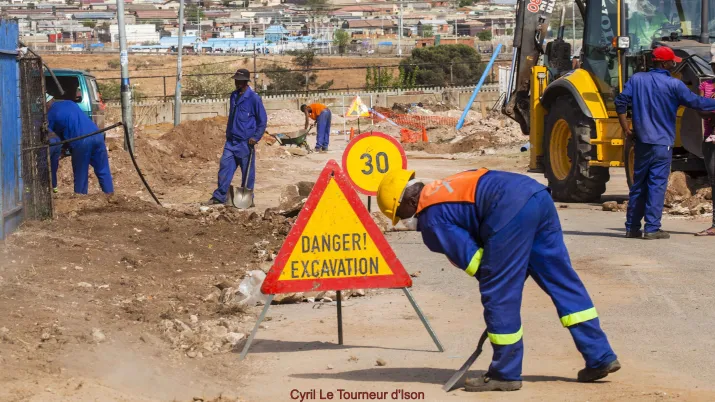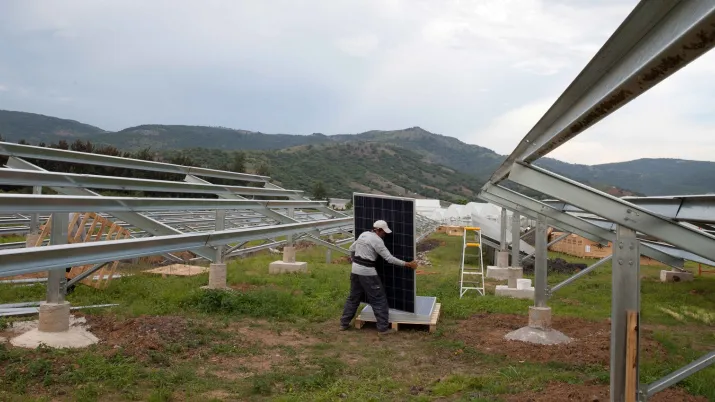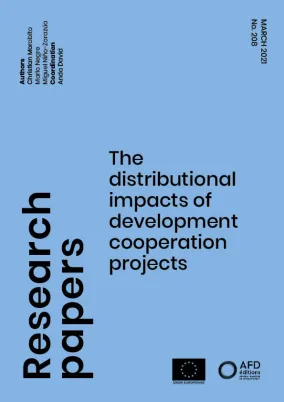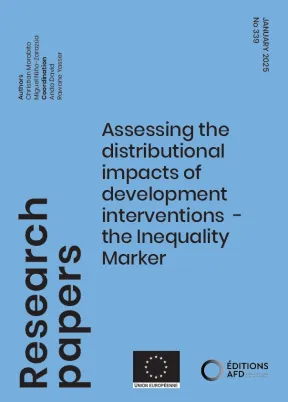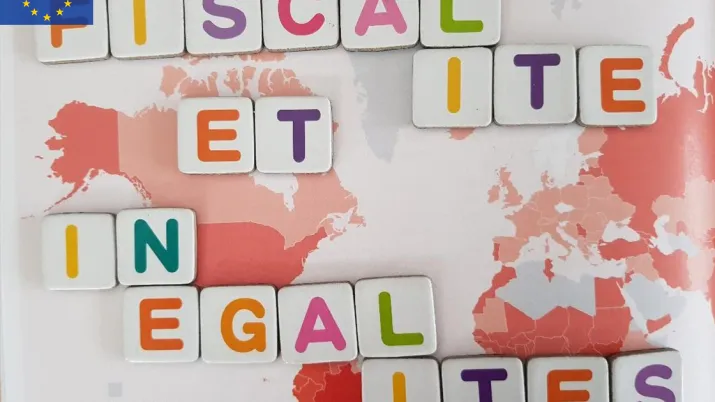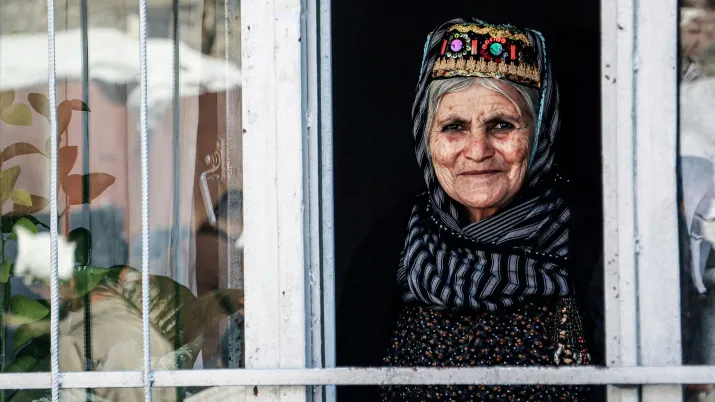Goal 10 calls on countries to adapt policies and legislation to increase the income share of the poorest 40% and to reduce wage inequalities based on gender, age, disability, social or ethnic origin, or religion. This includes promoting greater representation of developing countries in global decision-making.
 © AFD
© AFD
 Legal notice EU (project) The fear that cash transfer programs (or social grants) can discourage labor market participation is common among policymakers locally and around the world, including in South Africa. To refute or confirm this fear, the Extension of the EU-AFD Research Facility on Inequalities worked with the Development Policy Research Unit (DPRU) of the University of Cape Town to analyze the impacts of the Covid-19 grant on labor market recovery and investment in productive activity in South Africa.
Legal notice EU (project) The fear that cash transfer programs (or social grants) can discourage labor market participation is common among policymakers locally and around the world, including in South Africa. To refute or confirm this fear, the Extension of the EU-AFD Research Facility on Inequalities worked with the Development Policy Research Unit (DPRU) of the University of Cape Town to analyze the impacts of the Covid-19 grant on labor market recovery and investment in productive activity in South Africa.
Context
In South Africa, the social grant system is relatively comprehensive in scope, directly benefiting one in three individuals, and mainly empowering the most vulnerable such as children, the elderly and people with disabilities from poor households. Despite the progressiveness of this system, there remains a lack of assistance to the unemployed, who are presumed to be able to support themselves through the labor market (Ferguson, 2015). However, such a view overlooks the widespread and structural nature of unemployment in South Africa, where over 70% of the unemployed have been unemployed for more than a year.
In this light, the expansion of the country's social grant system in response to the Covid-19 pandemic played an important role in filling this gap. On the margins of the system, a special Covid-19 grant of R350 was introduced to support this previously unreached and important group of unemployed adults. With one of the highest official unemployment rates in the world (32.6 percent in the first quarter of 2021), the grant was an important form of support for millions of vulnerable adults and was the first to use an explicit labor market eligibility criterion that could be considered a "labor market vulnerability transfer."
This project is part of the Extension of the EU-AFD Research Facility on Inequalities. Coordinated by AFD and financed by the European Commission, the Extension of the Facility will contribute to the development of public policies aimed at reducing inequalities in four countries: South Africa, Mexico, Colombia and Indonesia over the period 2021-2025.
Objectives
Conducted by the UCT-DPRU team, the objective of this research project was to quantitatively study whether the Covid-19 grant acted as a source of labor market recovery by leading to increased investment in productive labor market activities.
To do this, the research aimed to provide a detailed and quantitative descriptive analysis of transitions in labor market outcomes among Covid-19 grant recipients (measuring whether individuals moved from vulnerable to more productive activities, for example), as well as an analysis of the correlation between grant receipt and labor market outcomes. Finally, it estimated the causal effects of subsidy receipt on a range of productive labor market activities.
Method
The analysis exploited representative survey data collected during the pandemic in South Africa (from the National Income Dynamics Study: Coronavirus Rapid Mobile Survey, NIDS-CRAM) to answer the following cross-sectional and longitudinal questions about the role of the subsidy:
- What is the correlational relationship between receipt and job-seeking behavior, labor market participation, and the probability of finding a job ?
- What is the correlation between receipt of the subsidy and the transition from a relatively unproductive labor market state to a more productive state over time?
- Does this relationship vary across different groups and subgroups of recipients?
Research findings
You will find below the research paper related to this project:
Contact
-
Anda DAVID
Economist, scientific coordinator of the EU-AFD Research Facility on Inequalities

Discover other research projects
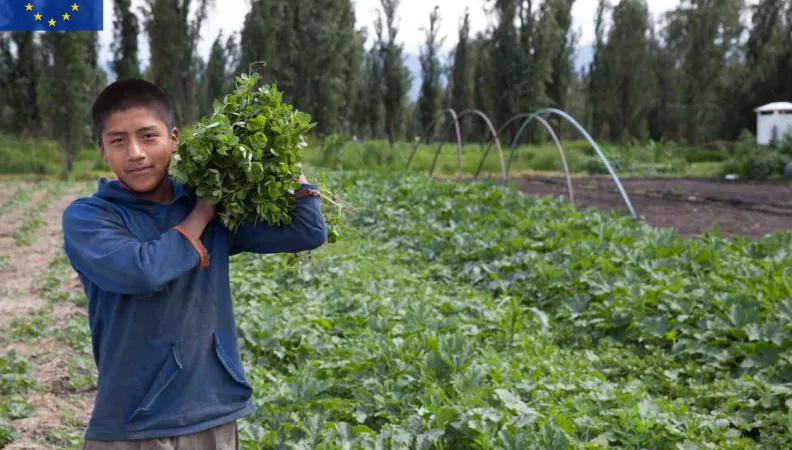 Latin America is one of the regions with the highest economic inequality in the world. Moreover, Mexico shows one of the highest levels of such kind of inequality within the region. Even public official data report a decrease in such level for the last 25 years, such reduction was less than insignificant. It has to be noted, as well, that right now an academic and public discussion related to potential underestimation of economic inequality is taking place in the country.
Latin America is one of the regions with the highest economic inequality in the world. Moreover, Mexico shows one of the highest levels of such kind of inequality within the region. Even public official data report a decrease in such level for the last 25 years, such reduction was less than insignificant. It has to be noted, as well, that right now an academic and public discussion related to potential underestimation of economic inequality is taking place in the country.
Context
In Mexico, more than 40 percent of the population is under the official poverty line. At the same time, Mexico is characterized by a society in which the socioeconomic origin condition is highly related to life achievement, especially on the extremes of the socioeconomic distribution (Vélez-Grajales et al, 2014). On this matter, empirical evidence shows that once the population is divided by quintiles, 48 out of 100 that were born in the lowest quintile stay there for the rest of their lives. Above the rest of them, i.e. those who are able to move to another quintile, 22 reach the second quintile. In summary, previous result leaves in poverty 70 percent of those with origin in the first quintile. It has to be noted that only 4 out of 100 that were born in the lowest quintile will move up to the top quintile.
On the other hand, above those that were born in the top quintile, 52 out of each 100 stay there for the rest of their lives. Moreover, above those that experience downward mobility, 28 out of each 100 move to the fourth quintile, i.e., 80 out of each 100 that were born in the top quintile will stay at least in the fourth quintile. Finally, it has to be noted that only 2 out of 100 that were born in the top quintile will move down to the lowest quintile. This means social mobility is very low.
This project is part of the first phase of the Research Facility on Inequalities, coordinated by AFD and funded by the European Commission's Directorate-General for International Partnerships over the 2017-2020 period. The first phase of the Facility has led to the conduct of 22 research projects and the publication of around 100 research papers and policy briefs.
Goal
How are economic inequality and social mobility related? Is it possible that the highest levels of socioeconomic persistence (lower social mobility) in terms of origin determined, in part, both perception and tolerance against economic inequality? The Mexican case, which is one where socioeconomic regional disparities are significant, represents a good option to analyze if such relationship holds. Moreover, there is still a gap in the literature for explaining the mechanisms behind the observed negative relationship.
Additionally, an important and relevant unanswered question for the Mexican case is the perception of Mexicans about inequality and social mobility levels. What if Mexicans think that the country is one of equal opportunities and results for all? Policy implications should be different among different perception scenarios. In any case, it is necessary to get information in order to understand the mechanisms at household and local level that explain the potential distance between perception and reality.
Method
First, using a multivariate analysis method, relative intergenerational mobility can be estimated for each macro-region of the country. Several inequality measures will be estimated, but for several points in time. The researchers have chosen to do so because it is possible that not current but origin economic inequality is the relevant one for intergenerational social mobility. Once the relationship is estimated, a discussion on the mechanisms behind it should be developed. The empirical analysis will be mainly based on the “Encuesta ESRU de Movilidad Social en México 2017”.
Additionally, work with groups in 4 different cities with different levels of socioeconomic performance will be held. The researchers expect to do fieldwork in at least two different spots within each city: one for a group of medium-high socioeconomic level and one of medium-low socioeconomic level. The interview will include a measure for both inequality and social mobility. In such a way, the researchers will be able to understand in a better way the relationship between perceptions and objective measures on the variables of research interest.
See this project's 2 minutes pitch from Alice Krozer, researcher at Colegio de México:
Results
You may find the research papers and the policy briefs linked to this project here :
Research papers:
- Social mobility in Mexico. What can we learn from its regional variation?
- Perceptions of inequality and social mobility in Mexico
Policy briefs:
- Wide regional differences in social mobility across Mexico
- Inaccurate public perceptions of inequality and social mobility in Mexico
Find the presentation of the research paper "Perceptions of inequality and social mobility in Mexico" by Aurora Ramirez Alvarez (Colegio de Mexico) during the first webinar of the Research Facility on Inequalities:
Contact
-
Anda DAVID
Economist, scientific coordinator of the EU-AFD Research Facility on Inequalities
Discover other research projects
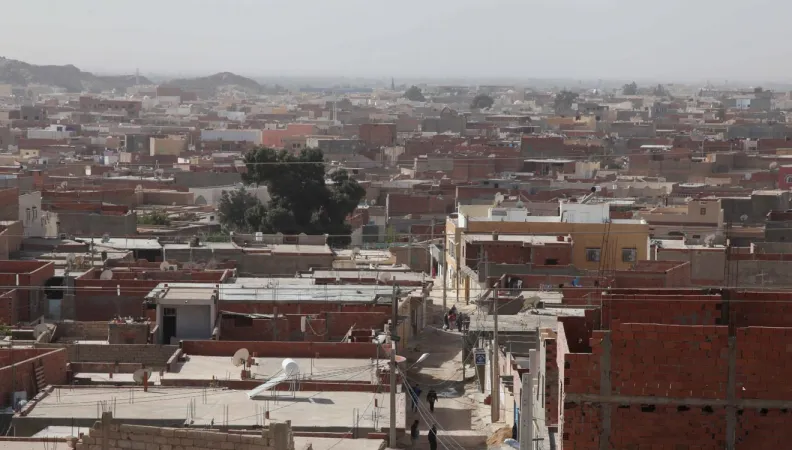 Legal notice EU (project) It is critical to assess how, and the extent to which, projects and programmes supported by development agencies contribute to the goal of reducing within country inequalities. A methodology (Morabito et al. 2021) proposes a set of analytical tools identifying potential distributional impacts of development programmes or projects by focusing on whether programmes’ beneficiaries belong to the bottom 40% of the wealth distribution through a mix of analytical tools.
Legal notice EU (project) It is critical to assess how, and the extent to which, projects and programmes supported by development agencies contribute to the goal of reducing within country inequalities. A methodology (Morabito et al. 2021) proposes a set of analytical tools identifying potential distributional impacts of development programmes or projects by focusing on whether programmes’ beneficiaries belong to the bottom 40% of the wealth distribution through a mix of analytical tools.
Context
Addressing persistent inequalities in income and other dimensions of wellbeing is a key policy objective of the Sustainable Development Goal 10. Multilateral and bilateral donor agencies have been directing their efforts towards promoting good governance, human and economic development, fighting hunger and reducing inequality.
The increase in development funding towards inequality reduction is accompanied by a need to monitor progress on the SDG 10 but most importantly, by the need to evaluate the contribution of development towards achieving this goal. However, measuring the distributional impacts of development cooperation projects is a challenging task due to a myriad of factors, including the effects that domestic redistributive policies, the structure of labour markets and other factors, such as institutions, have on inequality. The methodology developed by Morabito et al. enables the analysis of the potential contributions of development projects on inequality by looking primarily at the extent to which they disproportionally benefit the most vulnerable through a mix of analytical tools (a scoreboard, a statistical analysis of development projects based on the Equity Tool, a fiscal incidence analysis).
This methodology has first been tested on three development projects funded by AFD in Cameroon, Colombia and Tunisia as part of the first phase of the Research Facility on Inequalities.
This project was part of the first phase of the Research Facility on Inequalities, coordinated by AFD and funded by the European Commission over the 2017-2020 period. The first phase of the Facility has led to the conduct of 22 research projects and the publication of around 100 research papers and policy briefs.
A second phase of the research project was launched in 2022 with the aim to extend the initial phase, to further test the validity of the methodology with respect to income and other forms of inequalities and to develop the guidelines for an inequality marker.
Objectives
The initial phase of the project aimed at piloting the application of the methodology developed by the researchers on three projects funded by the AFD:
- A programme supporting urban housing improvements in Tunisia;
- A programme focusing on capacity-building of Small- and Medium-Sized Enterprises in Cameroon;
- A budget support operation aimed at supporting a health sector reform in Colombia.
The objective was to test the methodology and evaluate the relevance of its results, and, based on these findings, to review and adjust the methodology itself.
The second phase of the project aimed:
- To develop the guidelines for an inequality marker for development cooperation;
- To further test the methodology on four AFD and EU development programmes: a programme promoting sustainable access to electricity for the unserved poor rural populations in Benin; a programme improving the health and living conditions of the inhabitants of the rural district of Isingiro (Uganda) and its refugee camps; a programme facilitating trade between Ethiopia and Djibouti and enabling businesses and producers, as well as the most vulnerable populations, to benefit from these improvements; and a programme contributing to the adaptation of the communities to climate change in Vietnam.
Method
The initial study identified whether programmes’ beneficiaries of the three selected interventions belonged to the Bottom 40% of the wealth distribution, through a mix of analytical tools:
- First, a scoreboard that assessed whether or not inequality reduction was a central objective of development programmes;
- Second, the Equity Tool, which helped assess the position of direct beneficiaries within the national (urban or rural) wealth distribution;
- Third, the Commitment for Equity Tool, which helped estimate the distributional impact of general or sectoral budget support.
The methodological steps of the second phase of the research project were the following:
- Refining and upgrading the inequality markers and the scoreboard to provide clear benchmarks and indicators, aligned with evaluation approaches used by the European Commission, to assess whether development interventions focus on the poorest bottom 40% individuals, households or vulnerable groups that are targeted by specific development policies;
- Extending the scope of the Equity Tool questionnaire to include questions that capture the distribution of projects beneficiaries among vulnerable groups (women, ethnic, religious minorities, etc.);
- Applying the revised methodology to the four case studies.
Results
Results of the first phase of the project
Overall, the results underscore the importance of considering a pro-poor targeting ex-ante when designing development cooperation interventions that explicitly (or implicitly) aim to contribute to the reduction of inequalities in partner countries. The main strength of the methodology is that it allows an assessment of the potential reach of interventions for the bottom 40 percent of the income distribution. Therefore, the information provided thanks to this methodology can be critical to fine-tune policies before they are implemented and maximize their redistributive impact.
You may find the research paper here: The distributional impacts of development cooperation projects
Results of the second phase of the project
The second phase of this project resulted in:
- The elaboration of guidelines for the implementation of the methodology, which were used to develop the European Commission's Inequality Marker. The I-Marker assesses whether, and to what extent, inequality reduction is an objective of development intervention. For this purpose, a set of criteria has been developed to establish if: - I-0: Inequality reduction is not targeted; - I-1: Inequality reduction is a significant objective; - I-2: Inequality reduction is the principal objective. The I-Marker focuses on the bottom (poorest) 40% or socio-economically disadvantaged individuals, households or groups. Watch the video on the Inequality Marker for more information.
- A report on the testing of the methodology on the four case studies : Assessing the distributional impacts of development interventions - the Inequality Marker
Research findings
This project highlighted the importance of identifying direct and indirect beneficiaries of the projects, but also, more broadly, of having a complete understanding of the development cooperation interventions, which are being analyzed, especially their objectives and conditionalities.
Equally important is the involvement of key stakeholders to communicate the objectives, scope and limitations of the studies. In some cases, the inclusion of a qualitative component in the form of interviews, consultations, or eventually field missions, may be required to ensure the successful implementation and completion of studies.
Contact
-
Anda DAVID
Economist, scientific coordinator of the EU-AFD Research Facility on Inequalities

Related research publications
Discover other research projects
 Legal notice EU (project) The CEQ Assessment is a tool that analyzes the impact of taxation and social spending on inequality and poverty, allowing governments to assess the redistributive and poverty-reduction impact of their fiscal policy.
Legal notice EU (project) The CEQ Assessment is a tool that analyzes the impact of taxation and social spending on inequality and poverty, allowing governments to assess the redistributive and poverty-reduction impact of their fiscal policy. In the first phase of the project (2018-2020), Agence Française de Développement (AFD) and the Global Development Network (GDN), in partnership with the Commitment to Equity (CEQ) Institute as well as local universities and local authorities, joined forces to implement the CEQ assessment in four African countries: Morocco, South Africa, Cameroon and Kenya.
In order to document its five-year planning process, Senegal requested the support of AFD and GDN to study the impact of fiscal and social reform scenarios. A second phase of the project, focusing on Senegal but also on methodological issues, is thus taking place over the 2023-2024 period.
Context
In the first phase of the project, Morocco, South Africa, Cameroon and Kenya were selected to participate in the research, analysis, and policy recommendations program, which significantly enhanced the evidence base for efficient and thoughtful redistributive fiscal policy that protects poor and vulnerable households from further impoverishment. Each of these countries learned from, and in some cases incorporated, the successful programmatic experiences from the others. The work program that the AFD-CEQ partnership encompasses also promoted skills sharing and capacity building between countries.
This project was part of the first phase of the Research Facility on Inequalities, coordinated by AFD and funded by the European Union over the 2017-2020 period. The first phase of the Facility has led to the conduct of 22 research projects and the publication of around 100 research papers and policy briefs.
Part of the second phase of this project focuses on Senegal, which is facing a number of important, sometimes contradictory challenges, likely to bring about lasting changes to the social contract and the redistribution of national income, such as:
- the development of gas and oil deposits (and the collection of the associated tax revenues),
- the implementation of a just energy transition partnership (JETP), which at the same time calls for the decarbonisation of growth,
- the desired extension of social protection schemes (health, retirement) to accompany a demographic transition that is still underway,
- the dismantling of energy subsidies to finance more infrastructure and develop better-targeted subsidies for poor households.
There is strong social demand for policies to reduce inequality, but this is taking place against a backdrop of regional instability, increased conflict, global inflation and global warming.
This analysis will be conducted in partnership with the Directorate General of Planning and Economic Policies of the Senegalese Ministry of Planning and the World Bank.
Objectives
The development of the CEQ Assessments, which are the centerpiece of the AFD-CEQ Institute partnership, accomplish two major objectives simultaneously:
- The implementation of CEQ Assessments builds an empirical evidence base (country by country) of the redistributive and poverty-reduction impact of fiscal policy broadly, as well as of individual fiscal elements (revenues or expenditures).
- The implementation of CEQ Assessments together with local research teams completes a knowledge and skill transfer to researchers and policy officers who will remain close to the ongoing policy debate and policy-making bodies who benefit from having this information at their disposal.
The AFD-CEQ Institute partnership therefore leaves in place the basic human infrastructure necessary for additional fiscal incidence analysis, including forward-looking policy simulation.
As part of the second phase of the project, the aim is for Senegal to master the CEQ tax incidence analysis tool and study a series of pro-poor reforms to reduce social and/or regional inequalities.
The expected deliverable is a report quantifying the impact of 5 areas of reform (cost, effects, financing).
Method
The CEQ Assessment is a comprehensive and rigorous tax and benefit incidence analysis which enables to have an active engagement with the policy community.It is designed to address the following four questions:
- How much income redistribution and poverty reduction are being accomplished through fiscal policy?
- How equalizing and pro-poor are specifics taxes and government spending?
- How effective are taxes and government spending in reducing inequality and poverty?
- What is the impact of fiscal reforms that change the size and/or progressivity of a particular tax or benefit?
In order to address these questions, experts from the CEQ working along with AFD researchers and local researchers teams implemented the CEQ methodology in Morocco, South Africa, Cameroon and Kenya, and will do so in Senegal.
Once done, the objective is to mainstream the use of CEQ Assessments:
- By reaching out to the policy community through partnerships and policy forums;
- By disseminating findings through an active communication and advocacy program, undertaken in conjunction with key partners in the research, philanthropic and social activist communities.
Results
You can find below the various publications related to this research project.
Fiscal incidence analysis reports:
- Fiscal incidence, inequality and poverty in Kenya: a CEQ assessment
- The impact of taxes and transfers on poverty and income distribution in South Africa 2014/2015
- Les effets de la politique budgétaire sur la pauvreté et les inégalités au Maroc (in French)
Policy briefs:
- Fiscal Incidence and Public Spending: Public Policy Scenarios for Colombia (January 2024)
- Distributional Impact of Fiscal Policies: A Survey of Methodological Approaches (October 2024)
- Analyse de l’incidence de la fiscalité et des dépenses sociales sur la pauvreté et les inégalités au Sénégal (January 2025, in French only)
Contacts
-
Anda DAVID
Economist, scientific coordinator of the EU-AFD Research Facility on Inequalities

Discover other research projects
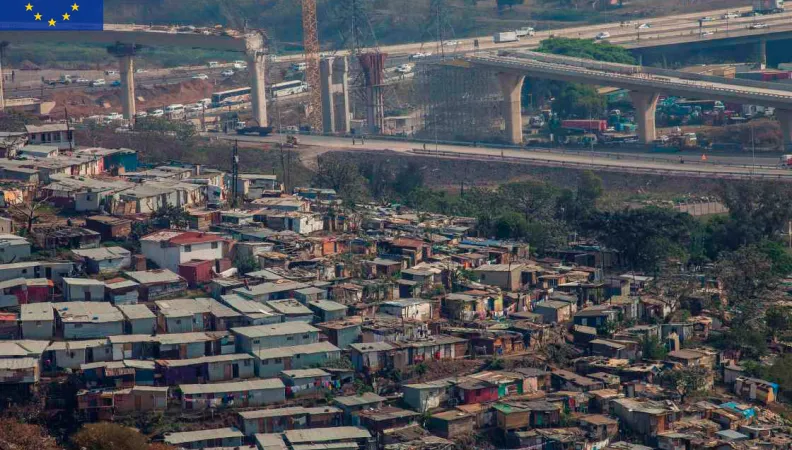 Legal notice EU (project) Inequality has emerged as the social challenge of the decade. Empirically, a series of influential studies of the available international evidence suggest that global inequality has been falling in the last quarter century. However, this encouraging trend appears to have been driven entirely by convergence in GDP per capita across nations and the consequent decline in inequality between countries, with the average inequality within countries remaining constant until the about 2000 but increasing thereafter.
Legal notice EU (project) Inequality has emerged as the social challenge of the decade. Empirically, a series of influential studies of the available international evidence suggest that global inequality has been falling in the last quarter century. However, this encouraging trend appears to have been driven entirely by convergence in GDP per capita across nations and the consequent decline in inequality between countries, with the average inequality within countries remaining constant until the about 2000 but increasing thereafter.
Context
The picture within Africa is more complex, and often obscured by problems with unreliable and non-comparable data, both over time and across countries. The most careful African data analysis suggests that, measured in monetary terms, African inequality is very high, Africa being the most unequal continent. There is, however, huge variation in the magnitude, changes and texture of this inequality across the continent.
This implies a double danger. Africa first needs to ensure that it is included in the international measurements. At least as importantly, the continent must also ensure that the particular contexts of its societies are considered in the analysis both of the factors causing inequality and the consequences of inequality. This analysis is absolutely crucial because it is the basis for policy interventions and civil society action, which are necessary to reverse the trend.
Given this context, a research project focusing on the development of diagnostic tools and capacity building was launched in partnership with the African Center of Excellence on Inequality Research (ACEIR) in the framework of the first phase of the Research Facility on Inequalities. The initial study (2018-2020) led to an in-depth analysis of inequalities in four countries: South Africa, Ghana, Kenya and Cote d’Ivoire. A Handbook on Inequality Measurement, which serves as a foundational guide for multidimensional inequality analysis, was also developed by ACEIR. The Handbook outlines key dimensions and indicators of inequality and provides guildelines for measuring income and beyond income inequalities.
This project was part of the first phase of the Research Facility on Inequalities, coordinated by AFD and funded by the European Commission's Directorate-General for International Partnerships over the 2017-2020 period. The first phase of the Facility has led to the conduct of 22 research projects and the publication of around 100 research papers and policy briefs.
Following the success of this research project:
- A fifth analysis was launched in Mozambique over the 2022-2024 period;
- A research project aming to expand and update the Handbook by incorporating methodologies for assessing vulnerabilities related to climate change and ecological transitions has also been launched over the 2024-2025 period.
Find out more
Goals
The main objective of this research project was to advance the analysis of African inequality and the policy discussion on strategies to overcome inequality in Africa through a series of country-level engagements. The project was given structure and impetus through the development of a diagnostic tool that was implemented in a limited number of pilot countries. This diagnostic tool consists of a thorough analysis of the various inequalities in a given country which enables the government to identify the priorities and policy options in order to reduce them.
In order to build the diagnostic tool, a Handbook was also developed to set up a common base which enabled country comparisons. To extend its use and improve accountability, it was backed with a central data hub and strong data centres in each partner country that allowed and facilitated further inequality analysis.
Existing multidimensional inequality analyses primarily concentrate on examining inequalities within the social and economic domains. While many low-income countries are severely impacted by climate change, there is a notable research gap in the analysis of inequalities related to climate vulnerabilities and their interactions with other socio-economic and environmental factors. The extension and updating of the Handbook, carried out over the period 2024-2025, aims to address this gap and provide the guidelines for integrating the analysis of climate-related inequalities in future diagnostics.
Method
The diagnostic tool is based on three pillars :
- a conceptual and empirical review of the studies on inequality in Africa, allowing us to have a baseline for the development of future projects, as well as a better comprehension of the specificities of inequalities in Africa and of their measurement;
- a Handbook which contains the framework proposed for the country inequality diagnostics, the methodological issues around the measurement of inequalities and their analysis and the important issues linked to policies;
- the support to the implementation of the country diagnostic, in collaboration with the pilot countries’ local research teams and the creation of the data hub.
In order to expand and update the Handbook, researchers will thoroughly examine and synthesise existing literature that addresses the measurement and analysis of climate-related vulnerabilities. This approach will help identify gaps in current research and propose a minimal set of indicators for measuring vulnerabilities linked to climate change and the imperatives of the ecological transition and detail appropriate data and measurement methods to enable their inclusion as part of an inequality diagnostic report.
Results
In practical terms, the country diagnostic takes the form of a report which overviews the inequality within a country, across all relevant dimensions, for a given time and over time. Alongside this, it summarises the main policies passed, or in place, expected to have an impact on inequalities. Each country will use their diagnostic as a platform:
- for policy engagements on strategies to overcome inequality,
- for the stimulation of national dialogue and a national research focus on inequality,
- to lead the national discussion through further, high impact research papers from the country node on inequality.
- The Handbook on Inequality Measurements for Country Studies: in order to insure a certain degree of comparability among all the country studies and to support researchers and statisticians in conducting inequality diagnostics, a Handbook was developed by the African Centre of Excellence for Inequality Research (ACEIR). An updated version with key metrics of climate change's impact on inequality is available.
- A review on inequality in Sub-Saharan Africa: this research paper takes stock of what we know about African inequality both to promote better analysis and better policymaking in addressing inequality in Africa.
- The diagnostic of inequality in South Africa, carried out by Statistics South Africa in partnership with the Southern Africa Labour and Development Research Unit (SALDRU), ACEIR in the EU-AFD Facility framework: Inequality trends in South Africa: a multidimensional diagnosis of inequality
This report was presented at a workshop involving all actors working to reduce inequality (11 February 2020 in Philippi, Cape Town), on the occasion of the 30th anniversary of the release of Nelson Mandela. You will find here the synthesis of the workshop here: Stakeholder engagement on inequality trends in South Africa.
- The diagnostic of inequality in Ghana, conducted by ISSER and the University of Ghana in partnership with the ACEIR in the EU-AFD Facility framework: Inequality Diagnostics for Ghana
- The diagnostic of inequality in Kenya, conducted by University of Nairobi in partnership with ACEIR in the EU-AFD Facility framework: Inequality Diagnostics for Kenya
- An in-depth analysis of inequality in Côte d'Ivoire (in French)
Several analyses have been conducted in partnership with local research centres:
- An analysis on the dynamics of social inequalities in Mozambique, conducted by Instituto de estudos sociais e economicos (IESE) and the University of Cape Town in partnership with ACEIR in the EU-AFD Facility framework
- The multidimensional diagnostic on inequalities in Colombia, conducted in close collaboration with Fedesarrollo and DANE
- The multidimensional diagnostic on inequalities in Indonesia, conducted in close collaboration with LPEM and BPS-Statistics.
The research project aiming to expand and update the Handbook resulted in:
- A research paper that conceptualizes the links between inequalities, climate change and the ecological transition in low and middle income countries: Inequality and Climate Change Measuring Interlinkages to Inform Equitable Climate Policy
- An updated edition of the Inequality Handbook that integrates key metrics of climate change's impact on inequality.
Contacts
- Anda David, Research Officer, AFD
- Rawane Yasser, Junior Research Officer, AFD

